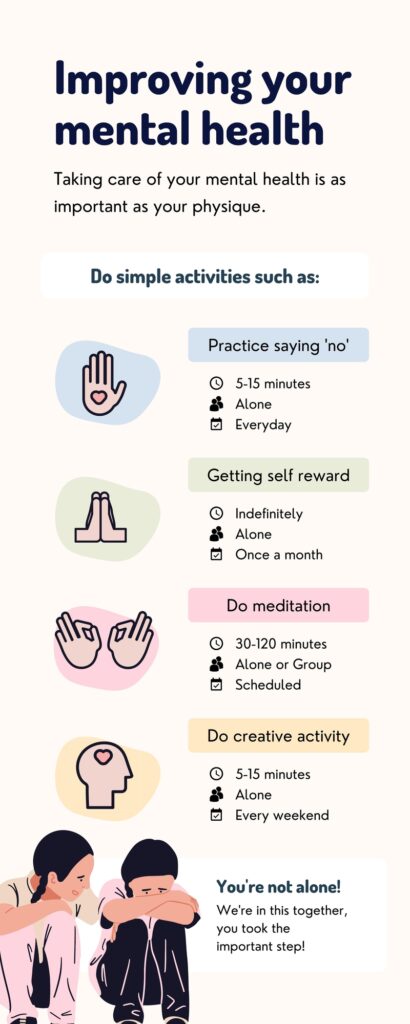Mental Health
What is Mental Health?
Mental health refers to our emotional, psychological, and social well-being. It impacts how we think, feel, and behave in our daily lives. It also helps determine how we handle stress, relate to others, and make decisions. Good mental health allows us to realize our full potential, cope with the stresses of life, work productively, and contribute to our community.
Emotional Well-being
Involves managing your feelings and reactions in a positive way.
Psychological Well-being
Focuses on maintaining mental stability and a positive mindset.
Social Well-being
Relates to the relationships we maintain and how we connect with the community.
"Mental health is not a destination, but a process. It’s about how you drive, not where you're going." - Noam Shpancer
Understanding Mental Illness
Mental illness encompasses a variety of mental health conditions that affect an individual's emotions, thoughts, and behaviors. These disorders can disrupt daily life, relationships, and physical well-being. Mental health conditions range from mood disorders like depression and bipolar disorder, to anxiety disorders, personality disorders, and trauma-related conditions such as PTSD. Each disorder has unique symptoms, but many involve difficulties with emotional regulation, cognition, or social functioning. Mental illness is treatable, with options including therapy, medication, and lifestyle changes.
Anxiety disorders involve excessive worry and fear that disrupt daily life, often causing physical symptoms such as rapid heartbeat. Treatment may include therapy and medication.
Depression leads to persistent sadness, loss of interest, and changes in behavior or energy levels. It is treatable through a combination of therapy, medication, and lifestyle changes.
Bipolar disorder causes extreme mood swings between manic highs and depressive lows. Therapy, medication, and support systems help manage symptoms.
PTSD arises from traumatic experiences, causing flashbacks, heightened anxiety, and emotional numbness. Effective treatments include cognitive-behavioral therapy and medication.
OCD involves obsessive thoughts and compulsive actions that interfere with daily life. Therapy, especially Exposure and Response Prevention (ERP), and medication can help.
It's important to remember that mental illness is a medical condition that can be managed with the right support and treatment.
Why Mental Health Matters
Your mental health is the foundation of how you navigate life's challenges. It affects how you feel, think, and interact with others. Small, intentional actions—like setting boundaries, practicing mindfulness, or engaging in creative outlets—help build resilience. These activities promote emotional balance, reduce stress, and enhance your overall quality of life. Whether you take five minutes to meditate or reward yourself for progress, each step counts. And remember, mental health is a shared journey—you're not alone.
Simple Ways to Start
- Practice saying “no”: Strengthen boundaries to reduce stress.
- Reward yourself: Acknowledge achievements, big or small.
- Meditate: Center your mind for better clarity and focus.
- Engage in creative activities: Express yourself and boost joy.
Taking care of your mental health is an ongoing process. Small, regular actions can transform how you feel and cope with life's challenges. The key is consistency and compassion for yourself. Start small today!

Featured Mental Health Articles
- The Importance of Rest Days in FitnessIn the quest for optimal fitness, one of the most overlooked yet essential aspects is the inclusion of rest days. Whether you're a beginner or a seasoned athlete, rest days play a critical role in recovery, muscle growth, and overall performance. However, many people still operate under the belief that more workouts equal faster results.… Read more: The Importance of Rest Days in Fitness
- Rotator Cuff Injuries: Causes, Symptoms, Prevention, and TreatmentThe shoulder joint is one of the most mobile and versatile joints in the human body, enabling a wide range of movements. This mobility, however, also makes the shoulder more susceptible to injury, particularly in the muscles and tendons that provide stability to the joint. At the heart of this stability is the rotator cuff,… Read more: Rotator Cuff Injuries: Causes, Symptoms, Prevention, and Treatment
- Are Sauna's Good for Heart Health?Sauna bathing, an ancient practice primarily associated with Finnish culture, has gained global popularity for its relaxation and potential health benefits. Among the purported benefits of sauna use is its positive impact on cardiovascular health. While traditionally used for relaxation and cultural rituals, modern research has increasingly focused on its physiological effects, particularly concerning heart… Read more: Are Sauna's Good for Heart Health?
- What Happens If You Stop Eating Sugar for 14 Days?Sugar is one of the most consumed ingredients worldwide, hidden in many processed foods and drinks. From pastries and candies to everyday condiments and beverages, sugar has become a staple of modern diets. However, research increasingly points to the harmful effects of excessive sugar intake. This has led many people to wonder, what would happen… Read more: What Happens If You Stop Eating Sugar for 14 Days?
- The Ultimate Vitamin D TalkWhat is Vitamin D? Vitamin D is a fat-soluble vitamin that is essential for several vital functions in the body. It is primarily known for its role in maintaining strong and healthy bones by aiding in the absorption of calcium and phosphorus. It is obtained through exposure to sunlight, certain foods like fatty fish and… Read more: The Ultimate Vitamin D Talk
Quick Links:
- Managing Anxiety
- Improving Sleep for Better Mental Health
- Overcoming Negative Thoughts
- How Exercise Improves Mental Well-being
